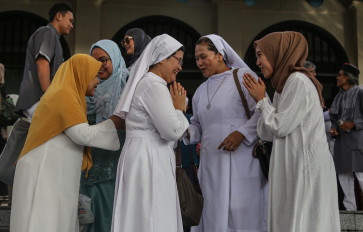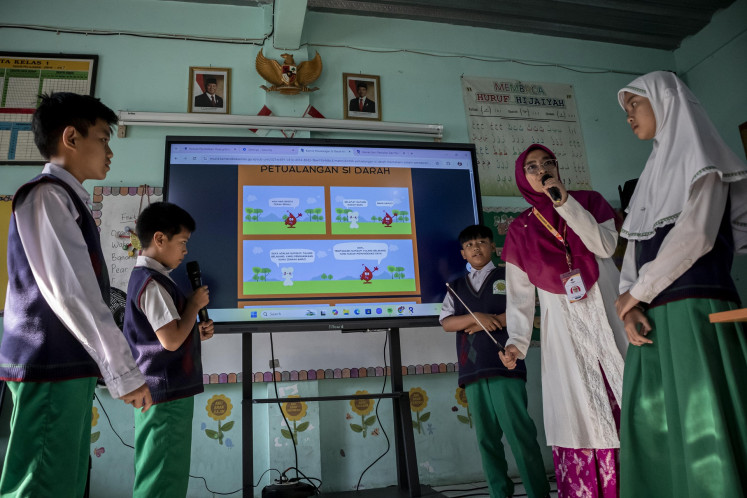Intolerant schools cause for alarm, but humane approach necessary: Experts
Educators say the discovery of dozens of Islamic boarding schools operated by the Khilafatul Muslimin should be a cause for alarm, calling the government to increase monitoring and guidance of schools down to the grassroots level.
Change text size
Gift Premium Articles
to Anyone

T
he recent government crackdown on hardline Muslim mass organization Khilafatul Muslimin, which is thought to have either funded or is affiliated with a number of educational institutions throughout the country, has sown fresh concerns over the threat of intolerant education in schools.
Authorities cracked down on the group, alleged to be looking to replace the state ideology of Pancasila with the caliphate, following a series of public outings by the group in Jakarta in late May. Police have now arrested two dozen members, including their leader Abdul Qadir Hasan Baraja, for violating the 2017 Mass Organization Law.
Educators say the discovery of dozens of Islamic boarding schools operated by the Khilafatul Muslimin should be a cause for alarm, calling the government to increase monitoring and guidance of schools down to the grassroots level.
“The lackluster supervision by the education and religious affairs ministries is something we all lament,” Feriyansyah of the Education and Teachers Association (P2G) said in a press statement last week.
“How could schools, suspected of being affiliated or even sheltered by the [Khilafatul Muslimin], go unnoticed for decades. This is a fatal collective failure,” he added.
Deputy secretary-general for the Indonesian Teachers’ Association (PGRI), Dudung Abdul Qodir, also urged the government to revisit its school-monitoring system, saying that it should not be difficult to filter out radical schools as long as the government utilizes a more grassroots approach.
According to Dudung, the government should start by providing support and guidance for teachers and school administrators to ensure that education falls in line with the national ideology.
“I am sure that if this is carried out properly, there will be no schools with radical [teaching]. That’s why the government needs to reevaluate its approach, to build a national network [of schools] with a more holistic approach to education,” Dudung said on Wednesday.
Read also: Khilafatul Muslimin troubled as police crackdown intensifies
Accusation of treason
Authorities have said that Khilafatul Muslimin’s control of some 30 Islamic boarding schools throughout the country was further grounds for arrest, as these schools violated the 2003 National Education Law by indoctrinating students with the teachings of the caliphate.
“These schools are based on the caliphate, and [students] were never taught Pancasila [ideology], as mandated by the 1945 Constitution. [They] were taught to obey only the caliphate and not the government,” the Jakarta Police director for general criminal investigation, Sr. Comr. Hengki Haryadi, said during a press conference last week, as quoted by Kompas.
Head of the National Counterterrorism Agency (BNPT), Comr. Gen. Boy Rafli Amar, said on Monday that the BNPT would provide counseling for students whose schools had been shut down, and had begun coordinating with the relevant ministries to provide a more long-term solution.
However, Boy did not reveal the number of school closures, saying that the government was still collecting data on the matter.
"Ministries, from the central level down to the regional administration, are in the process to find the best solution for students whose schools have been closed,” Boy said, as quoted by Kompas, adding that these students deserved an explanation behind their school closure.
Read also: Police investigate terror suspect allegedly spreading radicalism in school
Humanitarian approach
While the recent discovery of schools under the Khilafatul Muslimin banner is not the country’s first struggle with radicalism and intolerance in educational institutions, experts have continued to underline the importance of prioritizing a more humanitarian approach to solving the issue.
“I am sure that not all of the students in the Khilafatul Muslimin schools subscribe to their ideology. That’s why the government needs to focus on mapping out the situation and deradicalizing these students,” Rakyan Adibrata, country director for the International Association for Counterterrorism and Security Professional (IACSP) Indonesia, said on Wednesday.
According to Rakyan, most Islamic boarding schools did not start off as radical educational institutions. But over time, individuals who subscribe to these teachings – mostly consisting of people who have been disappointed by the state – might infiltrate these schools through teaching or administration posts.
Once the government discovers these radical schools, Rakyan went on to say, it should take a more diplomatic and peaceful approach, as opposed to just acting on concerns for national security.
“If any institution who stands against Pancasila is just forcefully eradicated without considering the collateral damage, the cycle of hatred [against the state] will just repeat. It’s more important to guide them,” Rakyan added.
Echoing Rakyan, Muhamad Bill Robby, researcher at the University of Indonesia’s Child Protection and Wellbeing Center (Puskapa), urged the government to avoid school closures, saying that such a policy would instead cause intolerant beliefs to be even more hidden and harder to detect in the future.
“Closures will only ‘sterilize’ children from radicalism or intolerance in schools, but it does not mean that they will not be exposed to it from other channels, such as [the school’s] alumni, informal student-teacher relationships outside of school or social media,” Bill said on Wednesday.
Puskapa, Bill went on to say, recommends the government ensure that schools develop students’ critical thinking, since it would help provide students with a more broad perspective on issues of identity, as well as media and digital literacy.









